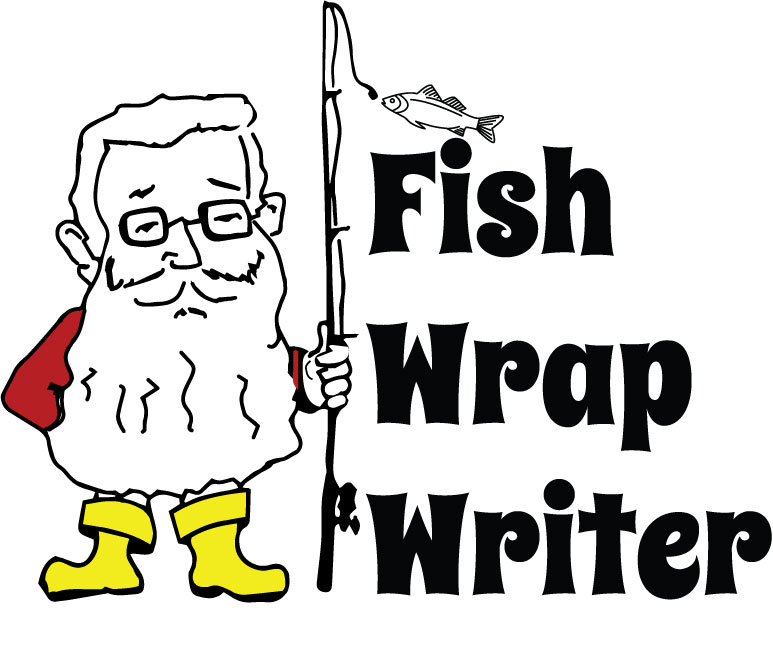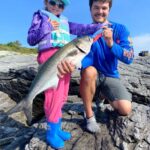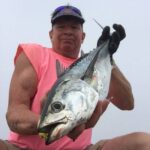Back in the day, John Swienton would turn the F/V Bonnie S north out of Block Island’s Old Harbor, then steam less than twenty minutes at eight knots to find his mark off Clay Head. Refilling his Thermos cup, he watched a high cliff line for one green mansard roof, checked the amount of water below, then made a careful triangulation with a secret land point to the southwest. When all was aligned, it meant we could set up to catch some cod with hand lines in the island’s cold shallow waters. With no digital distractions, it was an easy commute, chuckling to radio reports of traffic stacked up tight on the Route 10 inbound and later, a misfortune reversed on 95 westbound. For a few mornings each week, we sent down lead weights with baited hooks and kept tight fingers on two lines each, waiting for the soft feel of a hungry cod. Once on the hook, they required a strong, steady, constant retrieve to bring them to the deck as cod would sense any slack and slip away. These were good days, guided not by an HD screen, but from sights and smarts, from knowing hard from mud bottom just by the feel of a dropped weight or the fuzzy images on early-generation fathometers. A day’s catch reflected the experience of a solid captain and equally so, a solid fish stock. This was the mid-eighties and even on those good days, our catch was a fraction of historical levels.
Regulators have worked for years to control the cod stock slide but as is expected in the contentious, argumentative, untrusting world of fisheries management, the vast majority of their decisions only flare that little vein on the side of your head and, depending on the person you ask at any given waterfront, do little to no good or are a total waste of time. Today, the Gulf of Maine stock is at its lowest level since the college crowd started tracking it forty years ago. The biomass is now estimated to be at 3 or 4 percent of the lowest level of sustainability. In short, codfish, once so sacred that its image still hangs in the Massachusetts State House, is on the verge of not being able to even sustain itself.
In light of a fishery on the precipice of collapse and barely able to even reproduce, NOAA has instituted “rolling closures” that will be enforced on what were some of the richest fishing grounds in the world, in the Gulf of Maine and to the east of Massachusetts’ Cape Ann, an area larger than the state of Maine. Boats working the abutting open grounds will have a trip limit of 200 pounds, which gives them some space to retain a few as bycatch when targeting other groundfish, not just kick them back through the scuppers. The following move may be to reduce next year’s total catch limit to 200 metric tons. In 1982, when cod first became a fish of extensive research and monitoring, the catch was 22,000 metric tons.
Back in the day, Vikings survived on codfish they dried on deck, Basque’s salted it for supper and commerce with the Catholics, early European invaders to North America wrote of catching them, “not only with the net but in baskets let down with a stone, so that it sinks in the water.” In more modern times, codfish has served man as the fishing economy’s backbone and we have leaned on it heavily. The richest shallows of the Grand and Georges Banks have been worked for hundreds of years. Her close genetic cousins, haddock, hake and whiting, continue to be harvested in great numbers but it was cod, with her snow white flesh so prized for the plate, which was hit the hardest.
When a fishery is ready to implode, people become magicians, blurring and confusing with misdirection. While the recreational fisherman touts his experience catching a few fish under a lazy sun, taking home a very modest meal, it is the working fisherman who is accused of eviscerating stocks and that’s simply to deceive the reader. Although certainly true that commercial fishermen caught the lion’s share of groundfish, that’s only half the truth; the other is that we the people bought and ate all that fish and since each consumer beats the heart of successful capitalism, we all share responsibility. Magic fuels our ability to remember selective highlights of our past for contemporary rhetoric, recreating those good old days as a means of erasing the damage we did, focusing on our catch as if we were solo on the sea, even when we knew that sea floated hundreds and hundreds doing the same work. Collapse isn’t a sufficient word to describe this terrible and once-preventable loss. Last week, the pool winner on a local party boat was a twenty-pound cod, with the day’s average catch being an embarrassing five pounds. Codfish cakes have become just fish cakes, fish and chips is an obscure term; Lord only knows what a fish stick is. Local menus feature baked, broiled or fried scrod, a literary sleight of hand for some random type of white fish, used increasingly as real cod became too expensive or too rare. “Scrod”, for some, is an acronym for Special Chef’s Reserve Of The Day but that’s pure marketing. In reality, it’s an American bastardization of the Dutch word scrood, roughly translated as a piece or a chunk of fish.
Back in the day, fishermen had it good and not just the guys with commercial licenses. Drifting off Clay Head, working hand over hand, hauling big cod over an open stern, we were the lucky ones. Cod filled wooden boxes, padded wallets, fed nations, boosted trade, even started wars, but now thanks to our insatiable appetite for such fine white flesh, scrood might be better spelled scrued.





0 Comments